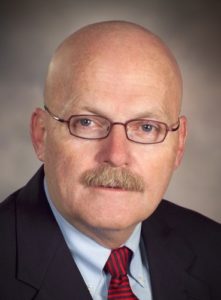“Have you not heard anything I’ve said in the last four weeks!? Just what do I have to be grateful about?”
The elderly widower in my grief group was incensed that the fourth session was focused on gratitude. The topic had made sense to me as facilitator since the group was meeting two weeks before Thanksgiving.
The group went silent. I waited a moment before responding.

Harold Ivan Smith
“Yes, in fact, I have been listening to you. You told me that you and your wife had 51 years of marriage. Not everyone gets 51 years. You told me there had never been a cross word between you and your wife. Not everyone gets that kind of marriage.
“So, you want to know what you have to be grateful for? Might you be grateful for all the people who attended your wife’s visitation and funeral? These days not everyone gets that turnout. Might you be grateful for all the individuals who brought casseroles, sent flowers, donated to the designated charity, who said, ‘Call me if you need anything?’ Not everyone gets that. Might you be grateful that you have your health and financial security? Not every widower has that. Might you be grateful that you were there, holding her hand when she took her last breath? Not everyone gets that.”
His reply: “OK, I guess I can do this.”
I reminded him of my instructions during the first session: “In this group, no one has to do anything that makes them uncomfortable.”
What triggered his annoyance? I had distributed a sheet of paper asking the participating grievers to reflect on their gratitudes. On the paper were 12 sentences with a fill-in blank: “Tonight, I am grateful for _____________.” I had announced they would have 10 minutes to write responses.
As the grief members wrote, I reminded myself that the widower’s response was not about me. It was about the reality that he always had counted on his wife making every holiday special. And he had no idea who would prepare the turkey in two weeks.
When the group returned to the circle, I asked, “Who would like to read their list of gratitudes first?”
The widower surprised me, “I want to read.”
Admittedly, he had “borrowed” my prompts.
“Tonight, I am grateful for 5l years of marriage. Tonight, I am grateful that in all those years we never had a cross word or argument. Tonight, I am grateful that I was holding Marjorie’s hand when she went to heaven.”
He started to read another gratitude but stopped. He tried again. He looked across the group at his two daughters, then back at his list. He read: “Tonight I am grateful that I married Marjorie … because… I would never have had … the two best daughters in the world. Two daughters that I love dearly.”
He dissolved into sobbing. The two daughters jumped up and hugged their dad.
“Is this a family hug or can anyone get in on it?”
Someone spoke up: “Is this a family hug or can anyone get in on it?” Suddenly a group hug was unfolding punctuated with lots of tears amid the other grievers.
I cannot remember who read next. When I closed the session, participants were slow to leave. Finally, as I packed up the materials, one daughter remained.
“Could I talk to you?” she asked.
“Sure.” We sat down.
“Well, that was really something,” I said.
“Yes,” she said, “that was ‘something.’” She paused. “Do you want to know why I think that was something?” After I nodded, she took a deep breath.
“I am 49 years old. Tonight was the first — the first! — time I have ever heard my father say he loved me.”
“How different my life would have been if I had heard him say those words then.”
She began to cry, then whispered, “I needed to hear that years ago … when I was a little girl … when I was a teenager … after my divorce. How different my life would have been if I had heard him say those words then.”
I could have interrupted her to say, “I understand. I only heard my father say he loved me once.” But I chose to remain silent and let the moment unfold.
Perhaps her elderly father had been thinking about telling her on several occasions but had just not gotten around to it or had not found “the right moment.” Perhaps, his father never had said those words to him.
Whatever, that night in a grief group he said the words aloud and in front of others. Both daughters walked out of St. Luke’s that November night with one significant gratitude they could add to their list. And it changed the one daughter’s life.
I had no reason to expect something dramatic would unfold that evening. But I walked out in the cold November night grateful that I had read a grief therapist’s suggestion to ask grievers to name three things they are grateful for before they go to bed. Each night. For 30 nights. In essence, they would audition gratitudes.
Months later, at a national grief conference, I made my way to the psychologist I had credited for suggesting the exercise. After I thanked him, he smiled and said, “I’ve never said or written that. I wish I had.”
I am grateful as I write this for an anonymous author who deserves credit for a great recommendation.
“Gratitude is the fertilizer for a good grief.”
I have said to many grievers, “Gratitude is the fertilizer for a good grief.”
Before I first suggested to my group that they offer three gratitudes every night for 30 days, I decided I ought to try the practice. Now, more than a decade later, every night I close my eyes and offer God three gratitudes, sometimes for big things and sometimes seemingly small things that I too commonly have taken for granted: like indoor plumbing (my grandparents never had that), like being able to set the thermostat to the temperature I want (my grandparents relied on funeral home fans).
I gratitude — and, to me, gratitude is a verb — in a culture that seems to be blessing-obsessed rather than gratitude-focused.
I seldom pray, “Bless me, God” because I have been blessed. In the coming Advent season, I will sing, “Bless all the dear children in thy tender care.” “Dear children” of all ages.
Often on ordinary days my memories call up old lyrics: “Make me a blessing, make me a blessing …. to someone today.” Or the great Mahalia Jackson hymn at Martin Luther King’s funeral: “If I can help somebody…”
Irving Berlin nailed it with these lyrics in White Christmas: “When I’m worried and I can’t sleep, I count my blessings instead of sheep, and I fall asleep counting my blessings.”
Might your sleep this stressful holiday season be improved by a some prenocturnal gratituding? Tonight I am grateful for… .
Harold Ivan Smith is thanatologist and independent scholar. For 18 years he served on the teaching faculty of Saint Luke’s Hospital in Kansas City, Mo. He earned graduate degrees from Scarritt College, Vanderbilt University, and a doctor of ministry degree from Asbury Theological Seminary. His writings include A Decembered Grief, On Grieving the Death of a Father; Grieving the Death of a Mother; When You Don’t Know What to Say; When a Child You Know Is Grieving, When Your People Are Grieving: Leading in Times of Loss.
Other articles in this series:
‘We’re so blessed!’ | Opinion by Mark Wingfield
Blessing is not about good fortune; it is akin to God’s love | Opinion by Ann Bell Worley
Original blessing, the #blessed hashtag, and what it really means to be blessed | Opinion by Andrew Daugherty
When being a ‘blessing’ comes with some baggage | Opinion by Amber Cantorna
Seeing mortality as a blessing | Opinion by Cynthia Astle
Blessed by life’s diversions | Opinion by Jeff Hampton
Blessing is naming what is true | Opinion by Erin Robinson Hall
The blessing of provocation | Opinion by Molly T. Marshall
Blessed to be a blessing, globally | Opinion by Erich Bridges
When you count your blessings, what do you count? | Opinion by Barry Howard
Blessings of the pandemic | Opinion by Phawnda Moore
When the system is based on comparison, won’t someone always be ‘more blessed’ and ‘less blessed’ than another? | Opinion by Christy Edwards
One malignant tumor, 2 surgeries and 6 weeks of radiation — never felt more blessed | Opinion by Marv Knox


